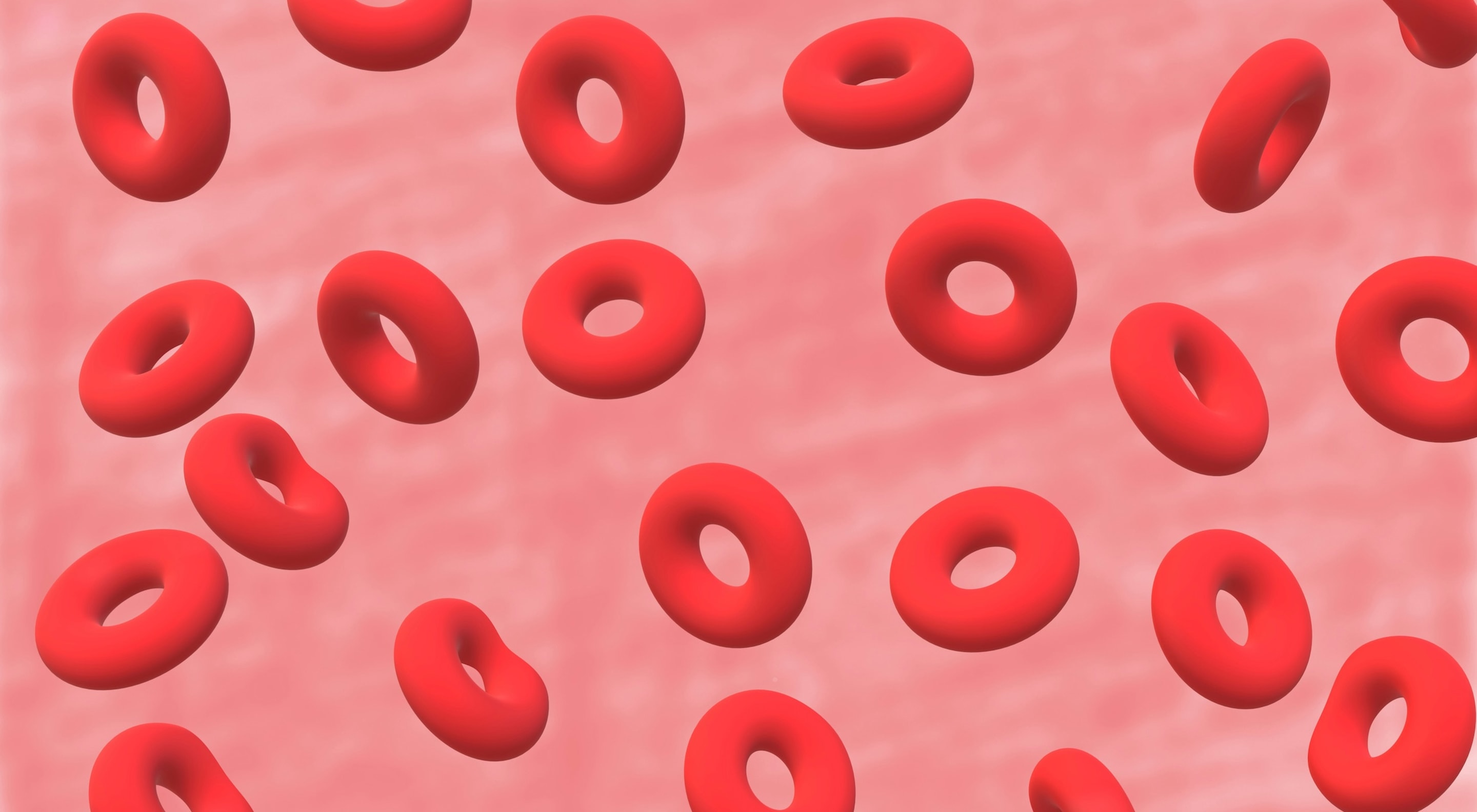
Important Blood Markers You Should Know for a Healthy and Long Life

How are you feeling today? You probably find it easy to answer this question. However, it will be much more difficult to say how you will feel tomorrow. Your blood markers can give you an indication of this and show you how your health is developing in the long run, which possible diseases and risks are already emerging.
There are different groups of blood biomarkers that can provide information about your health—from your metabolism and energy balance to your risk of diabetes. They influence your short-term and long-term health. Checking and optimizing them regularly can help you identify health risks early on and lead a longer, healthier life.

What Are Markers in Blood Tests You Should Have Checked Regularly?
You should keep in mind that your blood markers are constantly changing. Your habits, your living conditions, and your genetics influence how your blood biomarkers develop without you necessarily noticing. That's why it's important to have your blood markers checked regularly. If you are generally healthy, an annual check-up is recommended. If you have pre-existing conditions, more frequent checks are advisable.
Many people think that a complete blood count already contains all the relevant markers. In fact, it only shows the cell components of the blood, including the differential blood count for breaking down the white blood cells. However, vitamins, minerals, organ markers, inflammation markers in blood, and hormones are not included. For a holistic view of your health—especially with regard to prevention, performance, and longevity—you need an extended laboratory profile. A blood count also shows you the normal values you should aim for.
You should have the following blood markers checked regularly:
- Blood sugar: A permanently elevated blood sugar level—measured by the long-term HbA1c marker—can indicate type 2 diabetes. The HOMA index can provide additional indications of incipient insulin resistance, often long before diabetes is diagnosed.
- Cholesterol: Even more meaningful than LDL and HDL cholesterol is the ApoB marker. It measures the actual number of harmful blood fats that can settle in the vessels and is considered a precise blood marker for heart attack and cardiovascular disease. In addition, lipoprotein (a) should be determined once to assess genetic risk.
- Vitamin D: Many people in Germany regularly lack vitamin D, which can increase susceptibility to infections, exhaustion, and brittle bones.
- Omega-3 index: A low level can increase the risk of cardiovascular disease, sudden cardiac death, and chronic inflammation. A high omega-3 index, on the other hand, significantly reduces the risk of overall mortality.
- Vitamin B12: A deficiency can lead to fatigue, concentration problems, nerve damage, and anemia—especially in people who follow a plant-based diet or are elderly.
- hsCRP (high-sensitivity C-reactive protein): An elevated level can indicate inflammation markers in blood, which increase the long-term risk of cardiovascular disease. The marker detects even minor inflammation at an early stage and is particularly relevant for prevention.
How much do these blood tests cost?
If you have statutory health insurance, you will have to pay for many of these tests yourself, as they are not part of the standard check-up unless your doctor considers them necessary based on a diagnosis.
Prices are based on the German Scale of Medical Fees (GOÄ). The base rate is uniform throughout Germany, but can be multiplied by a surcharge (usually 1.15 to 2.3 times) depending on the amount of work involved. Some laboratories and home test providers work with flat rates.
Typical price ranges for self-payers (per marker):
- HbA1c: €12–15
- HOMA index: €20–25
- ApoB / lipoprotein(a): €12–18
- Vitamin D, B12, ferritin: €15–25 each
- Omega-3 index: €50–70
- Homocysteine: €20–35
- hsCRP: €12–15
- Thyroid profile (TSH, fT3, fT4): €25–40
- Cystatin C / GFR: €15–25
- Hormone profile (women): €40–60
- Cortisol daily profile (saliva): €40–60
- Catecholamines in urine: €35–50

Overview: Understanding the 7 Most Important Blood Markers
Ultimately, all blood markers are essential for your health. However, below we explain the seven most important groups that will give you a good overall picture of your current and future state of health.
Blood sugar markers: risk of diabetes
Glucose is the most important source of energy for your cells. Your blood sugar level shows how much of it is currently circulating in your blood. The fasting value shows a snapshot, while the HbA1c value reflects the average blood sugar level over the last few months. Permanently elevated markers can indicate impaired glucose utilization, an early indication of possible insulin resistance or type 2 diabetes.
The more stable your blood sugar is, the lower your risk of complications such as vascular damage, nerve damage, or heart problems. Fluctuations lead to inflammation, cell stress, and performance losses in the long term.
How to optimize your blood sugar:
- Exercise regularly, especially after meals (e.g., go for a walk).
- Eat complex carbohydrates instead of simple carbohydrates or sugar: whole grains, legumes, vegetables.
- Eat a diet rich in protein and fiber.
Get enough sleep, as lack of sleep reduces insulin sensitivity.
Blood Markers for Heart Attack: Blood lipid markers show your cardiovascular health
Cholesterol is a fatty substance that your body needs for cell walls, hormones, and vitamin D production. It is transported via the blood—and that's where the difference lies: LDL cholesterol is considered “bad” because it can build up in the walls of blood vessels and promote arteriosclerosis. HDL cholesterol is the “good” cholesterol that removes excess fats. Triglycerides, on the other hand, are blood markers for heart attack risk when elevated. They are produced from excess energy (primarily sugar and alcohol).
An unbalanced fat profile increases the risk of heart attack and stroke.
How to optimize your blood lipids:
- More unsaturated fatty acids: e.g., from nuts, olive oil, avocados
- Less sugar and alcohol
- Exercise, especially endurance training
Omega-3 fatty acids (e.g., fish, algae oil) lower triglycerides and inflammation
Liver markers for metabolism and detoxification
The liver detoxifies your blood, stores nutrients, and breaks down medications, alcohol, and hormones. The GOT, GPT, and gamma-GT markers show how well your liver cells are working or whether they are already irritated or damaged. Elevated levels indicate inflammation, overload, or fatty liver, even if you still feel healthy.
Early detection of liver damage often allows for effective treatment. Left untreated, it can lead to serious diseases such as liver inflammation or cirrhosis.
Here's how you can relieve your liver:
- Ideally, avoid alcohol altogether or reduce your consumption to a maximum of two drinks per week.
- Only take medication when necessary.
- Eat a liver-friendly diet: bitter substances, vegetables, low fat and sugar.
- Lose weight, especially belly fat.
- Exercise to improve the liver's fat processing.
Kidney markers for organ function
Your kidneys filter around 1,500 liters of blood every day. They maintain the balance of water and salt in your body, excrete toxins, and regulate blood pressure and acid-base balance. Creatinine and urea are waste products of metabolism. The more of these substances there are in your blood, the poorer your kidneys' filtering function. However, the glomerular filtration rate (GFR), which directly indicates kidney performance, is more meaningful. People with a high protein intake, for example, through protein shakes, should also have their cystatin C levels checked, as this marker is independent of muscle mass.
What’s tricky: initial kidney damage often has no symptoms. These blood biomarkers therefore serve as an early warning system, even for people with no known pre-existing conditions.
Here's how you can support your kidneys:
- Drink enough fluids, especially water and unsweetened tea
- Keep your blood pressure within the normal range
- Adjust your protein intake and seek medical advice if you are under a lot of stress
- Consume salt in moderation to avoid putting pressure on your kidneys
Inflammation markers in blood—an early warning system for silent inflammation
Chronic, silent inflammation often smolders unnoticed—but in the long term, it puts strain on your body and is considered a contributing factor to many common diseases. The CRP marker is a sensitive blood marker for inflammation in the body. Highly sensitive CRP (hsCRP) is particularly accurate, detecting even the slightest inflammation in its early stages. Elevated homocysteine levels can also indicate inflammatory processes and increased cardiovascular risk. Last but not least, the number of leukocytes (white blood cells) also provides clues as to whether your immune system is actively fighting something.
A slightly elevated CRP level is often a sign of oxidative stress, poor nutrition, obesity, or lack of sleep—all of which can be influenced.
Here's how you can reduce silent inflammation:
- Anti-inflammatory diet: lots of vegetables, omega-3 fats, little sugar
- Stress management: mindfulness, breathing exercises, breaks
- Get enough sleep—at least seven hours
- Moderate exercise: e.g., walking, swimming, yoga
Minerals and vitamins for energy, immune system, and bones
Micronutrients are the silent helpers in the background. Vitamin D supports your immune system, regulates inflammation, and is essential for bone health. Vitamin B12 is vital for blood formation, nerve function, and energy metabolism. Iron transports oxygen in the blood—a deficiency makes you tired and pale. Magnesium ensures that your muscles, nerves, and heart rhythm function properly. Selenium and zinc in whole blood are also important: they strengthen the immune system and have an antioxidant effect.
A balanced ratio of these trace elements supports your cells, especially during times of stress or silent inflammation. An imbalance often only becomes apparent at a late stage as fatigue, poor concentration, or muscle cramps.
Here's how you can improve your micronutrient intake:
- Lots of fresh vegetables, nuts, legumes, and whole grains
- Supplement vitamin D if deficient, ideally after a blood test
- Eat iron-rich foods: red meat, millet, lentils—best combined with vitamin C
- Supplement B12 if you follow a plant-based diet
Hormonal blood markers for metabolism, stress, and energy
Hormones control almost everything—from your temperature and metabolism to your mood. The thyroid gland produces hormones that influence your energy metabolism. TSH is the key control value, but it is not meaningful on its own. In order to properly assess thyroid function, the free thyroid hormones fT3 and fT4 must always be measured as well. An imbalance often manifests itself in weight fluctuations, fatigue, nervousness, or depressive moods.
Cortisol is your central stress hormone. It is helpful for a short period of time, but chronic elevation puts strain on the heart, sleep, and immune system.
Here's how you can balance your hormones:
- Reduce stress, e.g., through meditation, nature, conscious breaks
- Regular sleep pattern, even on weekends
- Have your thyroid function checked by a doctorincluding fT3 and fT4
- Eat a balanced diet, as nutrients such as selenium, zinc, and iodine are important for hormone production

Longevity: The Role Blood Markers Play in a Long Life
A long life begins with healthy choices and knowing what is happening in your own body. Longevity blood markers levels are essential for early prevention. Many chronic diseases such as heart attacks, strokes, or diabetes develop slowly over years. Blood markers such as blood sugar, blood lipids, or inflammation markers show you early on whether your body is heading in the wrong direction. This allows you to take countermeasures in good time before things get serious.
Thoses values are an important part of prevention, especially in the context of longevity—the goal of staying healthy and productive for as long as possible. They help you identify risk factors before symptoms appear. This gives you an early warning system that shows you where your body is today and how you can strengthen it in a targeted manner.

How to Optimize Your Blood Markers: Nutrition, Sleep, and Lifestyle
The most important levers for strengthening your blood markers lie in everyday life: nutrition, exercise, regeneration, and sleep. Often, medication is not necessary—instead, consistent decisions for your health are required.
Healthy nutrition as a basis
What you eat influences your metabolism, your inflammation levels, and your hormone regulation. A balanced diet with plenty of vegetables, high-quality fats, and little sugar can help keep blood sugar and fat levels stable. [5]
We highly recommend:
- Omega-3 fatty acids (e.g., from fatty fish, flaxseed, algae oil) can have an anti-inflammatory effect
- Fiber from vegetables, legumes, and whole grains can lower blood sugar and cholesterol levels
- Avoid sugar, white flour, and highly processed products as much as possible—they can strain your metabolism and promote silent inflammation
Exercise for your metabolism
Regular exercise can improve almost all blood markers: it can lower blood sugar, blood lipids, and blood pressure, promote blood circulation in the liver, and help burn excess fat. Just 150 minutes of moderate activity per week—about 20 minutes a day—can make a difference.
The ideal combination is:
- Endurance training (e.g., walking, jogging, cycling)
- Strength training to build muscle mass
- Everyday exercise: taking the stairs instead of the elevator, walking short distances, taking active breaks
Stress reduction and good sleep for your recovery
Chronic stress can throw your hormone system out of balance, increase inflammation levels, and disrupt blood sugar metabolism. Too little or poor sleep can also have a negative effect on many blood markers—such as cortisol, blood sugar, and inflammation levels. [6]
What helps:
- Breathing exercises, meditation, or walks for mental relaxation
- Evening routines that lead to calm: little screen time, fixed bedtimes, relaxation through exercise
- Regular, deep sleep—seven to eight hours per night is considered ideal

Why You Should Know Your Blood Markers
Important blood biomarkers are probably the most reliable early warning system for your health. They show you how your body is working long before any symptoms arise. If you know your markers, you can take targeted action: identify risks, optimize processes, and regain energy.
Whether blood sugar, inflammation markers, or hormones, many of these important blood values can be actively influenced through diet, exercise, sleep, and stress management. You don't need to make radical changes, just be mindful in your everyday life.
So check your longevity blood markers regularly and combine this with a healthy lifestyle: BLACKROLL® supports you with products for exercise, regeneration, and sleep that can be easily integrated into your life.

FAQ – Frequently Asked Questions About Essential Blood Markers
Sources & Studies
- https://www.praktischarzt.de/magazin/die-10-wichtigsten-blutwerte/
- https://www.sciencedirect.com/science/article/pii/S1551714420302020
- https://www.who.int/publications/i/item/9789240015128
- https://www.sleephealthjournal.org/article/S2352-7218(15)00015-7/fulltext
- https://www.rki.de/DE/Aktuelles/Publikationen/Journal-of-Health-Monitoring/GBEDownloadsJ/FactSheets/JoHM_2016_02_ernaehrung4.html?templateQueryString=vitamin+d
- https://www.dge.de/gesunde-ernaehrung/gut-essen-und-trinken/dge-empfehlungen/










